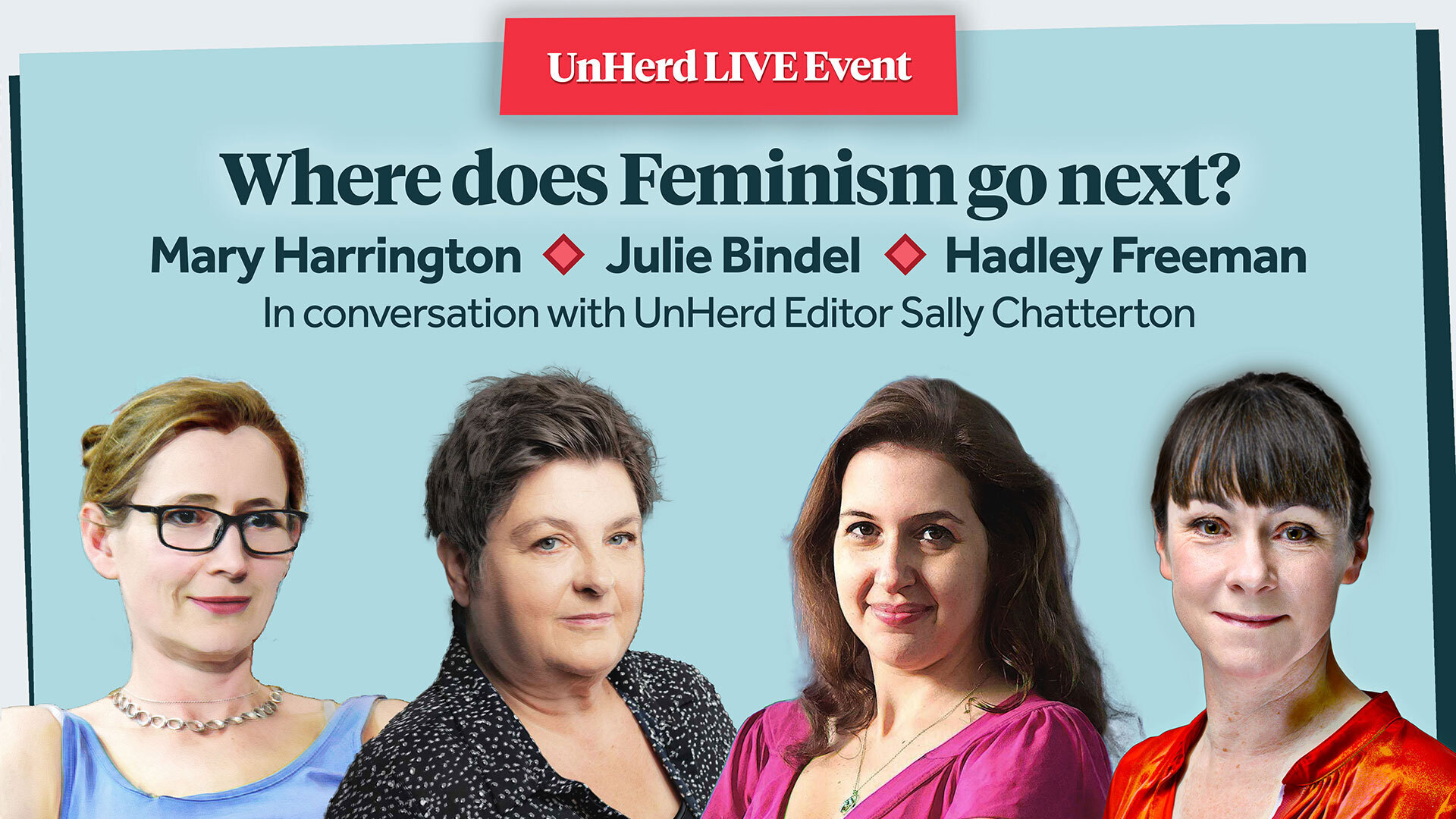I always knew it would start with sport.
Back in 2018, when the obvious fallacies of gender ideology made me feel merely puzzled as opposed to completely enraged, a friend of mine went to the Commonwealth Games. He’s a sportswriter, and a few years younger than me and so – adhering to the generational divide on this issue – he disagreed with me about gender. He thought I was too rigid in my belief that changing gender is not the same as changing sex, which I maintain is impossible. He also thought my fears that males would disproportionately benefit and potentially exploit from the blurring between gender and sex were overblown. Stop being so binary, daddio, we’re all fluid now!
It so happened that it was at this Commonwealth Games that a trans athlete was allowed to compete for the first time: weightlifter Laurel Hubbard. Hubbard was widely expected to win gold, despite being 40-years old and therefore about twice as old as her competitors. My friend watched Hubbard’s event and he texted me afterwards. Hubbard hadn’t won, he wrote, because she injured her elbow. There was a pause while he wrote the next text. Then it came through: “But OK. I understand what you have been saying.”
So I always knew it would start with sport. The great advantage sport has over, say, prisons and refuges is that it happens in public: people can see it and they are interested in it. That’s why when historians write about that relatively brief but extremely toxic time when gender extremism gripped western countries, and they describe the moment when that grip loosened, they will start with the photos of Lia Thomas, the Ivy League trans swimmer, towering over her teammates. These caught the mainstream interest in a way feminist arguments about trans women in prisons never have: here is an issue where even Homer Simpson can see the obvious problem.
While Hubbard was middle aged and in far from peak condition, Thomas is, visibly, a very different story, and her teammates and the parents of other swimmers have been extremely vocal in their protests. Encouraged, no doubt, by the openness of the arguments about Thomas, protests kicked off again when it was announced that 21-year-old Emily Bridges — who, until last month, was racing as a man — would compete in the women’s British National Omnium Championship. Bridges was ruled out at the last minute when someone realised she was, rather awkwardly, still registered as a male cyclist. But a change of tone was palpable in British Cycling’s announcement afterwards that “fairness is essential”, and Sara Symington, the head of Britain’s Olympic cycling programme, said the UCI needed to change its policy of allowing transgender riders to compete against women.
Not very long ago, the fear of being denounced as a transphobe meant that doubts about extreme gender ideology were confined to private WhatsApp groups and quiet conversations among friends. This is very much no longer the case. Two weeks ago, the Times’s chief sports writer, Matt Dickinson, wrote on Twitter, “Are we really talking about fairness in sport in the transgender debate – or fear and prejudice?”
“Fairness” replied hundreds of women, including some from his own paper. The only replies agreeing with Dickinson were from other male sports writers, insisting that the way the trans women athletes had been treated was “horrendous and disgusting” (John Cross, Daily Mirror ) and “awful” (Martyn Ziegler, The Times) It’s sweet how males always stick together, isn’t it?
Gender ideologues complain that this shift in public tolerance is merely a conservative backlash against trans rights, but they are wrong. What we are seeing is the inevitable result of trans activists – and, most of all, Stonewall – pushing far beyond civil rights for trans people and insisting instead on unpopular and unworkable policies, such as trans women in sport, child transition and any open acknowledgement of female biology.
This third issue caused the Labour Party to have one of its regular internal breakdowns, as its politicians – and leader – became unable to answer the question, what is a woman? And not only could they not answer the question, they couldn’t think of a way to not answer the question, hemming and hawing about it being a “gotcha” question. Yes, it is, interviewers replied, and what we’re trying to get is an answer that a three-year old could provide. Last month, Angela Rayner came up with a solution: “I think we should be taking it off social media and taking it away from commentators,” she intoned solemnly. Ah yes, censorship from the left. That always plays so well! Oddly, only a month earlier Rayner had been loudly insisting that the next leader of the Labour party will be a woman. Presumably that kind of woman-chat is permitted by Rayner, just not what a woman actually is.
The Tories have certainly not been spared from all this. On 30 March, at 2:48am, the Tory MP Jamie Wallis posted on Twitter to say that he’d been diagnosed with gender dysphoria and would like to be trans. Suddenly, his long history of dodginess – from running companies that attracted more than 800 complaints, to being affiliated with a sugar daddy website, to fleeing the site of a car crash – was instantly forgotten and his honesty and courage were trumpeted to parliament’s rafters by, among others, the Prime Minister. It was strikingly reminiscent of that time, in 2015, when Glamour magazine named Caitlyn Jenner Woman of the Year, two months after she was involved in a car accident in which a woman, Kim Howe, died. The district attorney ruled there wasn’t enough evidence to convict Jenner, but Glamour decided they had all the evidence they needed to cite her as the year’s best woman. At least Caitlyn bothered to make an effort: in the sobering light of day, Wallis tweeted, “I remain the same person I was yesterday, and so will continue to use he/him/his pronouns.” So no change at all, then, other than the identity of being trans. Or wanting to be, anyway.
For several years now, Stonewall has been campaigning hard for self-ID, which is when a person can be whatever gender they say they are without any physical intervention, to be recognised in law. Wallis can now self-identify as a woman and he is a handy illustration of what happens when theory collides with reality. Nothing else about Wallis has changed, not even his all-important pronouns. But according to Stonewall’s argument, he’s a woman. As much as gender ideologues try to paint gender critical feminists as “radical”, they are the radical ones, insisting that everything we know about biology and society is wrong, and that people can see one thing with their eyes, but must say something else with their mouths. How far was the Conservative Party going to allow themselves to go with this new radical position?
Last week, the Tories executed a double U-turn, the result of which was to press ahead with banning conversion practices in regards to sexual orientation – in other words, outlawing “pray away the gay” practitioners – but not in regards to gender. Iain Anderson, the Government’s LGBT business champion resigned, saying that the Tories were putting “dividing lines between LGB and Trans people”. Stonewall pulled out of the forthcoming Safe To Be Me event, the UK’s first LGBT+ conference, followed by a consortium of LGBT+ voluntary and charity organisations — including “Body Positive Cheshire and North Wales” and “Claire’s Transgender Talks”.
Ultimately, Safe To Be Me was cancelled, but this has certainly not stopped the angry discourse. The author Philip Pullman tweeted, “To ban conversion therapy, so-called, is good. To make a deliberate exception for trans people is pure, cold-eyed evil. No justification, no reason, no excuse: just to appease the transphobes. Evil.”
Language matters. Trans activists know this better than most, which is why they’re so insistent about pronouns and trans inclusive terms such as “pregnant people” and “uterus haver”. Conversion therapy is a terrifying term. Exploratory therapy, or talking therapy, is much less so, and that is actually what was at issue here.
Contrary to what Stonewall, Pullman and the rest of them think, there were many reasons for the Government’s decision, and they are laid out in the Cass review, which was published last month. This echoes concerns already expressed in the courts, and by several NHS whistleblowers. Namely, that gender dysphoria is not the same as sexuality (as Stonewall — of all organisations — surely knows), and there may be many reasons for a child feeling confused about their gender. At the moment, two-thirds of gender dysphoric young people are girls, many display signs of autistic spectrum disorder, some have eating disorders, some may be gay. Stonewall and other organisations insist that the way to treat these children is through “affirmative therapy”, which tells them they are correct to feel uncomfortable in their bodies and should change gender.
But as the Cass review stresses, so much is still unknown about gender dysphoric young people: there may be many reasons for their distress, ranging from sexual abuse to internalised homophobia. These young people need to explore their feelings with a professional, not be rushed into medical treatments that can have deeply damaging long-term effects. That is not an endorsement of conversion therapy, but of good therapeutic practice. After all, in what other scenario are distressed young people encouraged to diagnose and treat themselves?
Then, yesterday, the Prime Minister felt sufficiently emboldened to say what the Labour leader still cannot, and what so many women — from Kathleen Stock to Maya Forstater — had been sacked for expressing in the past: gender ideology, in its extreme form, doesn’t make sense and it doesn’t work. “I don’t think it’s reasonable for kids to be deemed so-called Gillick-competent to take decisions about their gender or irreversible treatments that they may have,” he said. He added that “biological males” and should not be competing in women’s sports, and that private spaces in hospitals, prisons and changing rooms should be single sex, thereby echoing the EHRC, which this week said that transgender people can be excluded from single-sex services for reasons of privacy, decency, to prevent trauma and to ensure health and safety.
In other words, the feelings of trans people do not, in all instances, trump the needs of women — which is what the gender ideologues have been arguing for all along. Johnson added that he is “immensely sympathetic to people who want to change gender… But these are complex issues and I don’t think they can be solved with one swift easy piece of legislation. It takes a lot of thought to get this right.”
The gender activists loudly cried that this was a re-run of Section 28. But if you heard bigotry in the PM’s words, you weren’t really listening: Johnson sounded moderate and realistic. Meanwhile Labour continues to flail in the background over whether or not men can get pregnant. The Left have handed the Right this victory on a gold platter.
This was the week when the wheels started to come off the ideological bandwagon, when Stonewall’s grip on British politicians began to loosen. Quite how it all started in the first place is a story for another day, although that story could well start in 2016 when Ruth Hunt — then the CEO of Stonewall, now in the House of Lords — admitted in a speech that Stonewall was having difficulty raising donations after gay marriage was legalised, as donors thought gay people were “all right now”. “And what we’ve had to say to them is, well, you still wouldn’t feel safe enough if you were on the night bus, but well done for being rich enough to get an Addison Lee,” she said. She then reeled off further examples of people who might need Stonewall’s help, and concluded with “You still wouldn’t be safe enough if you were transitioning in your gender.” Did Hunt hype up the gender campaign and sell out women – which, of course, includes lesbians and bisexual women – just to ensure Stonewall’s revenue flow? Like I said, a story for another day.
In the end, it wasn’t one person who pointed out that gender extremism wears no clothes. There were so many: therapists, academics, parents, authors, athletes, politicians, barristers, journalists, scientists, feminists, gay activists, all shouting over the years that this ideology would hurt women, children, gay people and trans people. And this was the week the spell began to break.

UnHerd Live: Where does feminism go next?
Disclaimer
Some of the posts we share are controversial and we do not necessarily agree with them in the whole extend. Sometimes we agree with the content or part of it but we do not agree with the narration or language. Nevertheless we find them somehow interesting, valuable and/or informative or we share them, because we strongly believe in freedom of speech, free press and journalism. We strongly encourage you to have a critical approach to all the content, do your own research and analysis to build your own opinion.
We would be glad to have your feedback.
Source: UnHerd Read the original article here: https://unherd.com






